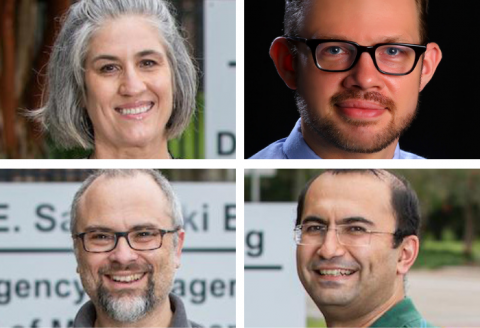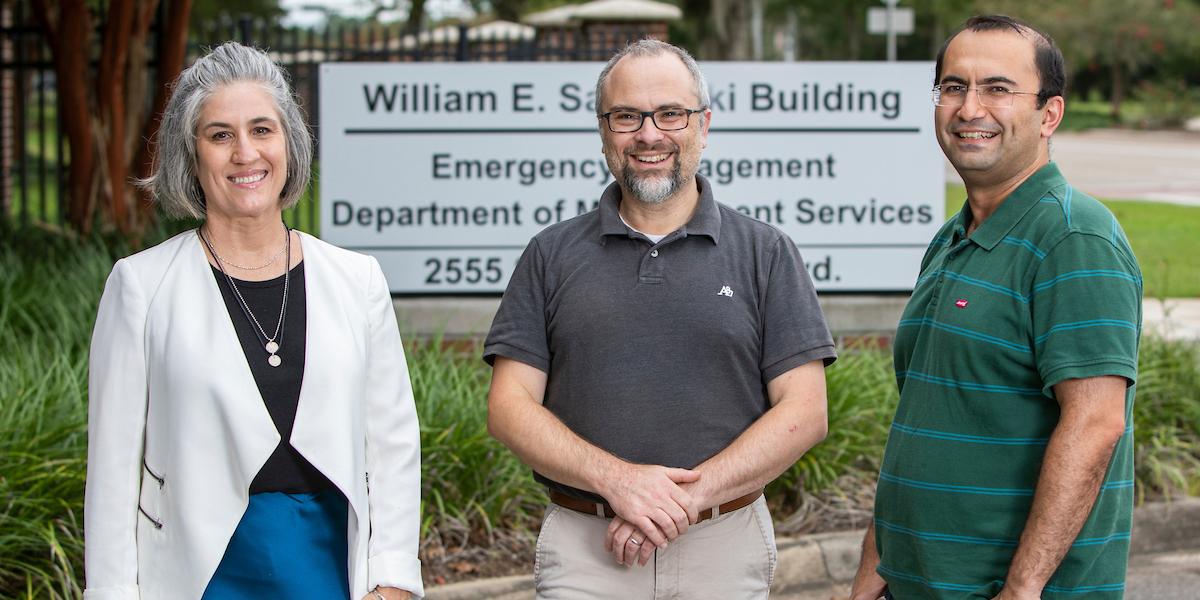Interdisciplinary Research Team Receives NSF Grant to Study Pandemic Impacts on Natural Disaster Shelters

Florida State University (FSU) and Florida A&M University (FAMU) received a National Science Foundation, Excellence in Research Historically Black College and University Grant of more than $500,000. The grant will allow the interdisciplinary research team to study how to better prepare for hurricanes and other natural disasters that co-occur with public health emergencies like the COVID-19 pandemic.
Hurricane season causes a yearly threat to the health and safety of the citizens of the coastal areas of Florida. Hurricane and emergency planning are further complicated by the additional health and safety threats of the coronavirus.
The study is entitled “Excellence in Research: Bending the Curve for Vulnerable Populations: A Data-Analytical and Socio-Technical Decision-Making Framework for Sheltering in Hurricane-Pandemic.” The three-year project, headed by researchers at the FAMU College of Engineering (COE) and FSU College of Social Work (CSW), will examine ways to safely meet shelter and evacuation needs during a hurricane without increasing infection rates among Floridians.
“We want to develop effective methods to handle hurricane sheltering operations in the midst of a pandemic,” said Arda Vanli, an associate professor in industrial and manufacturing engineering at the COE)and the principal investigator of the study.
The project brings together engineering and social work experts with expertise in statistical learning, infrastructure resilience, disaster risk analysis, community-engaged research, and social vulnerability. The group will systematically study the project’s research problems to find practical solutions to Florida communities' public health and safety needs. The team includes John Mathias, an assistant professor in the CSW, and Ellen Piekalkiewicz, director of the FSU Center for the Study and Promotion of Communities, Families and Children (CFC Center) housed at the CSW.
The social work perspective is a critical component to the overall project as social workers and other helping professionals work directly with the vulnerable populations the project is attempting to serve. “Input from local social workers is valuable for understanding these vulnerabilities and how to best address them,” explained Piekalkiewicz.
Social worker team members will implement their portion of the project through a two-step process, explained Savannah Smith, CFC Center clinical program associate. First, bi-monthly focus groups will be established with 15-20 governmental and non-governmental community stakeholders in emergency management from the Big Bend region. The focus groups will target stakeholder priorities, formulate models, identify novel challenges, and apply study findings to the realities facing the regions. Stakeholders will also provide further insight into the formulation of survey questions to be administered to local social workers and emergency management staff.
During the second step of the process, researchers will survey local social workers to learn about vulnerability and resilience among the localized clients they serve. “By engaging community stakeholders and surveying, we will make the data relevant to the needs of the most vulnerable populations,” said John Mathias, principal investigator for the portion of the study being focused on by the College of Social Work and CFC Center team members.
The challenges of natural disasters combined with a public health crisis strain resources needed by vulnerable communities. The interdisciplinary team wants to put in place a framework that assists public health and emergency managers with allocating resources and minimizing the spread of disease.
"The co-occurrence of geophysical hazards with COVID-19 pandemic has challenged the resilience of our most vulnerable populations,” said Eren Erman Ozguven, an associate professor of civil and environmental engineering, co-principal investigator of the study and director of the Resilience Infrastructure and Disaster Response Center at COE. “As a result of social distancing requirements, the capacity of regular shelter space may be reduced drastically. We can better serve the needs of populations if we maximize our resources with comprehensive data.”
The researchers plan to use a community-engagement approach while combing methods from both engineering and social sciences. Epidemic models and hurricane evacuation analysis will also be used to predict and prevent the spread of disease and more safely use hurricane shelters. “The study combines the strengths of qualitative and quantitative methods to produce plans that address diverse factors in vulnerability and resilience,” said Mathias.
Social workers from across the state of Florida will have the opportunity to voluntarily participate in the study’s survey, which will be administered digitally. To learn more about how to participate, contact the CFC Center at csw-cfc@fsu.edu.
The NSF EiR-HBCU grant is funded through the Florida A&M University with Florida State University as a partner and supports the multidisciplinary education and technical training of minority students.
 Ellen Piekalkiewicz, Dr. Arda Vanli and Dr. Eren Erman Ozguven posing in front of the Emergency Management, Department of Management Services.
Ellen Piekalkiewicz, Dr. Arda Vanli and Dr. Eren Erman Ozguven posing in front of the Emergency Management, Department of Management Services.
